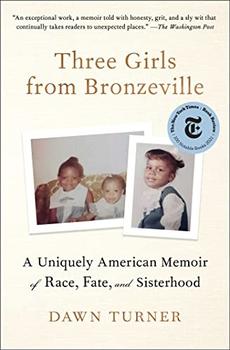Summary | Excerpt | Reviews | Beyond the Book | Read-Alikes | Genres & Themes | Author Bio

A Uniquely American Memoir of Race, Fate, and Sisterhood
by Dawn TurnerThis article relates to Three Girls from Bronzeville
Could you forgive the person who murdered your beloved son?
Weeks after Debra Trice was convicted of the first-degree murder of Raymond Jones she received a letter. It was from Margaret Jones, Raymond's mother. Mrs. Jones wrote, "[Y]ou have my forgiveness. So, when you feel you cannot make it, look up and talk to God, Jehovah is his name. Don't think of not living. He will not give you more than you can bear." She ended the letter with, "Please don't do anything to hurt your mother and sister's heart. They love you very much. Show them you are strong, not for yourself, but for them."
Debra is the sassy, pretty girl in Dawn Turner's memoir Three Girls from Bronzeville: A Uniquely American Memoir of Race, Fate, and Sisterhood. She answered Mrs. Jones' letter with a promise: She was going to make something good come out of the tragedy. Over time, the two continued to write each other, and Raymond's mother always signed her letters with the closing "Love, Mrs. Jones."
This, though, was the sorrow Mrs. Jones endured: "On the night Raymond died, she sat in the street, holding his body. It was so hot that blood had congealed on the asphalt around her and when it suddenly began to rain heavily, she watched the water swish the blood down the drain." But she forgave Debra anyway.
Forgiveness studies began in the late 1980s with a paper in the Journal of Adolescence. Before then, related scientific work centered on apology or seeking forgiveness but not the act of forgiving others the way Mrs. Jones would forgive Debra.
Dr. Fred Luskin of Stanford University explains that there are three types of forgiveness: Interpersonal forgiveness, where someone has hurt you. Intra-personal forgiveness is forgiving yourself. And existential forgiveness is forgiving God or nature for hurt or trauma.
Dr. Loren Toussaint of Luther College, along with Dr. David Williams (Harvard), Dr. Marc Musick (University of Texas) and Dr. Susan Everson-Rose (University of Minnesota), conducted a study on forgiveness with around 1,500 participants. It found older adults like Mrs. Jones forgave more than younger adults. It also found a significant correlation between forgiveness and positive health outcomes.
To forgive someone who has done a horrible thing like murder is to connect with their humanness, according to Dr. Toussaint: "When we characterize someone as evil or monstrous, we dehumanize, we make them less than we are, and it's easy to want to destroy them, to gain revenge, to punish them as harshly as possible."
Often, society treats prisoners as unforgivable. Shortly before Debra was granted parole, she met the daughter and widow of the man she murdered in a restorative justice reconciliation session. Debra's best friend, the author Dawn Turner, was present, as was a counselor. At the Madison Correctional Facility, in a private meeting room, Debra went through the details of what happened the night of the murder as those she had victimized patiently listened.
Raymond Jones' daughter Whitney and Whitney's mother Terri then spoke about everything they had lost and how Debra's moment of violence, accident or not, was the pin pulled from the grenade that shattered everything. Finally, Terri said to Debra, "I wasn't going to come here angry. I wouldn't come until I could say I forgive you and mean it. And I mean it now. I forgive you."
While studies such as the one done by Dr. Toussaint show that forgiving people lead happier and more fulfilling lives, they also suggest that some people may be more naturally inclined towards forgiveness. But according to Dr. Karen Swartz of the Mood Disorders Adult Consultation Clinic at The Johns Hopkins Hospital, forgiveness is a decision, through which "you are choosing to offer compassion and empathy."
Sixty-two percent of American adults state they need more forgiveness in their lives. Dr. Swartz stresses the significance of forgiving to health: "There is an enormous physical burden to being hurt and disappointed." Chronic anger can increase the risk of depression, heart disease, diabetes and other conditions. Swartz explains that forgiveness can be a conscious personal choice made regardless of whether the person you are forgiving deserves it, saying, "As you release the anger, resentment and hostility, you begin to feel empathy, compassion and sometimes even affection for the person who wronged you."
Filed under Medicine, Science and Tech
![]() This "beyond the book article" relates to Three Girls from Bronzeville. It originally ran in November 2021 and has been updated for the
June 2022 paperback edition.
Go to magazine.
This "beyond the book article" relates to Three Girls from Bronzeville. It originally ran in November 2021 and has been updated for the
June 2022 paperback edition.
Go to magazine.
A library, to modify the famous metaphor of Socrates, should be the delivery room for the birth of ideas--a place ...
Click Here to find out who said this, as well as discovering other famous literary quotes!
Your guide toexceptional books
BookBrowse seeks out and recommends the best in contemporary fiction and nonfiction—books that not only engage and entertain but also deepen our understanding of ourselves and the world around us.